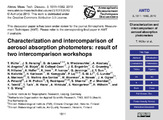Por favor, use este identificador para citar o enlazar este ítem:
http://hdl.handle.net/20.500.11765/6515
Characterization and intercomparison of aerosol absorption photometers: result of two intercomparison workshops [Discussion paper]
| Título : | Characterization and intercomparison of aerosol absorption photometers: result of two intercomparison workshops [Discussion paper] |
| Autor : | Müller, Thomas; Henzing, J. S.; Leeuw, Gerardus de; Wiedensohler, Alfred; Alastuey, Andrés; Angelov, H.; Bizjak, Milan; Collaud Coen, Martine; Engström, Erik; Gruening, Carsten; Hillamo, Risto; Hoffer, Andras; Imre, Kornélia; Ivanow, Petko; Jennings, G.; Sun, Jielun Y.; Kalivitis, Nikos; Karlsson, Hanna; Komppula, Mika; Laj, Paolo; Li, Shao-Meng; Lunder, Chris; Marinoni, Angela; Martins dos Santos, Sebastiao; Moerman, Marcel; Nowak, Andreas; Ogren, John A.; Petzold, Andreas; Pichon, Jean Marc; Rodríguez González, Sergio


 ; Sharma, Sangeeta; Sheridan, Patrick J.; Teinilä, Kimmo; Tuch, Thomas; Viana, Mar; Virkkula, Aki; Weingartner, Ernest; Wilhelm, R.; Wang, Yaqiang
; Sharma, Sangeeta; Sheridan, Patrick J.; Teinilä, Kimmo; Tuch, Thomas; Viana, Mar; Virkkula, Aki; Weingartner, Ernest; Wilhelm, R.; Wang, Yaqiang |
| Palabras clave : | Absorption photometers; Aerosol properties; Photometers; Aerosoles; Fotómetros de absorción |
| Fecha de publicación : | 2010 |
| Editor: | European Geosciences Union |
| Citación : | Atmospheric Measurement Techniques Discussions [Preprint]. 2010, 3, p. 1511–1582 |
| Versión del editor: | http://www.atmos-meas-tech.net/4/245/2011/ |
| Resumen : | Absorption photometers for real time application have been available since the 1980s, but the use of filter-based instruments to derive information on aerosol properties (absorption coefficient and black carbon, BC) is still a matter of debate. Several workshops have been conducted to investigate the performance of individual instruments over the intervening years. Two workshops with large sets of aerosol absorption photometers were conducted in 2005 and 2007. The data from these instruments were corrected using existing methods before further analysis. The inter-comparison shows a large variation between the responses to absorbing aerosol particles for different types of instruments. The unit to unit variability between instruments can be up to 30% for Particle Soot Absorption Photometers (PSAPs) and Aethalometers. Multi Angle Absorption Photometers (MAAPs) showed a variability of less than 5%. Reasons for the high variability were identified to be variations in sample flow and spot size. It was observed that different flow rates influence system performance with respect to response to absorption and instrumental noise. Measurements with non absorbing particles showed that the current corrections of a cross sensitivity to particle scattering are not sufficient. Remaining cross sensitivities were found to be a function of the total particle load on the filter. The large variation between the response to absorbing aerosol particles for different types of instruments indicates that current correction functions for absorption photometers are not adequate. |
| Patrocinador: | The work described in this paper was supported by the EU FP6 Integrated Infrastructures Initiatives (I3) project EUSAAR (European Supersites for Atmospheric Aerosol Research, project FP6-026140), with the EU FP6 Network of Excellence ACCENT (Atmospheric Composition Change: A European Network, project GOCE-CT-2004-505337) and the WMO GAW (Global Atmosphere Watch) program. |
| URI : | http://hdl.handle.net/20.500.11765/6515 |
| ISSN : | 1867-8610 |
| Colecciones: | Artículos científicos 2010-2014 |

Ficheros en este ítem:
| Fichero | Descripción | Tamaño | Formato | ||
|---|---|---|---|---|---|
| amtd-3-1511-2010.pdf | 4 MB | Adobe PDF |  Visualizar/Abrir |
Los ítems de Arcimis están protegidos por una Licencia Creative Commons, salvo que se indique lo contrario.





